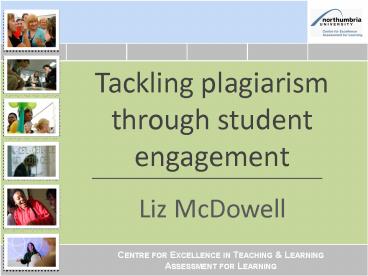Tackling plagiarism through student engagement - PowerPoint PPT Presentation
1 / 21
Title:
Tackling plagiarism through student engagement
Description:
Tackling plagiarism through student engagement. Liz McDowell ... a hostile meeting of opposing ... without a basic commitment on the part of the student there ... – PowerPoint PPT presentation
Number of Views:45
Avg rating:3.0/5.0
Title: Tackling plagiarism through student engagement
1
Tackling plagiarism through student engagement
- Liz McDowell
Centre for Excellence in Teaching
Learning Assessment for Learning
2
Definitions of engagement
- a hostile meeting of opposing military forces
- an agreement to be at a particular place at a
particular time - an enterprise embarked upon
- the act of sharing in the activities of a group
- employment of the attention
- emotional involvement or commitment
3
Alienation
- without a basic commitment on the part of the
student there is no moral constraint on cheating
or plagiarism - (Ashworth, Bannister Thorne, 1997, p. 202)
4
(No Transcript)
5
The Good Student acquiring knowledge in context
6
The Good Student
- You put it in your own words but its not
really your own words - I never know what she is after or what any
lecturer is after - I dont think Id be that confident about
putting in my own ideas because the way I see
it is the people Im learning from obviously know
more than I do and I think I might look a bit
stupid
7
Plagiarism?
- theyll knock lots of marks off if you dont
reference properly. Its just how its done
isnt it? The same as how you use English and
everything like that
8
The Good Student 3 ways to help
- Understanding the rules
- Building student and staff relationships
- Drawing on student knowledge and experience
9
The Conscientious Consumer active management of
context
10
The conscientious consumer
- I choose a title where I can define what Im
meant to be investigating and discussing ... then
have arguments either way. I usually prefer
something specified like that - Ive enjoyed it up to this point, but as long as
I get a good result I wouldnt be bothered - Professor X talks to me he thinks Im really
interested! - It doesnt matter what I think - at the end of
the day youre looking towards what mark you can
get and you think, well, theres more evidence
to support this conclusion
11
Plagiarism?
- Doing your references is not exactly a hard
thing to do, I mean the way theyre structured
now on electronic journals Ive found a way you
can click on and it gives you the text youd
actually use for a citation so you can copy it
into your assignment.
12
The Conscientious Consumer 3 ways to help
- Interaction and collaboration with fellow
students - Formative assessment, practice and developmental
tasks - New views and connections with the subject
13
The Committed Learner development of
understanding
14
The Committed Learner
- You think I want to find more about that and I
want to find more about that and it just takes
over really! - I really felt it was totally my own work ... So
I felt like I really wanted it to go well and I
needed to do well - ... When you read from other peoples primary
sources of work you actually feel as if youre
learning something directly - People are talking about their subject because
it has actually come to affect their lives
15
Plagiarism?
- youre going to have all your ideas from
somewhere, arent you? - I dont feel I can just look at books and just
write stuff that people have already written ...
Because it seems a bit pointless, so I feel
youve got to have something quite original in
there for it to be worthwhile writing anything
16
The Committed Learner 3 ways to help
- Feedback dialogues
- Reduce summative assessment requirements
- Offer choice and opportunities for self-direction
17
Assessment for Learning
Centre for Excellence in Teaching
Learning Assessment for Learning
18
(No Transcript)
19
References
- Ashworth, P., Bannister, P. Thorne, P (1997)
Guilty in whose eyes? University students
perceptions of cheating and plagiarism in
academic work and assessment Studies in Higher
Education, 22 (2), pp. 187 203 - Crook, C. Dymott, R. (2006) Assessment
relationships in higher education the tension of
process and practice British Educational Research
Journal, 32(1) pp, 95-114 - Dweck, C. S. (2000) Self-theories their role in
personality, and development. Philadelphia,
Psychology Press
20
References
- Higgins, R., Hartley, P. Skelton, A. (2002) The
Conscientious Consumer reconsidering the role of
assessment feedback in student learning. Studies
in Higher Education, 27 (1), pp. 53-64 - Krause, K. (2006). On being strategic in the
first year. Keynote presentation, Queensland
University of Technology First Year Forum, 5
October 2006. Available online at
http//www.griffith.edu.au/centre/gihe/
21
References
- Mann, S. J. (2001) Alternative Perspectives on
the Student Experience alienation and engagement
Studies in Higher Education, 26 (1) pp. 7-19 - McDowell, L (2008) Negotiating assignment
pathways students and academic assignments
Teaching in Higher Education (due August 2008)































